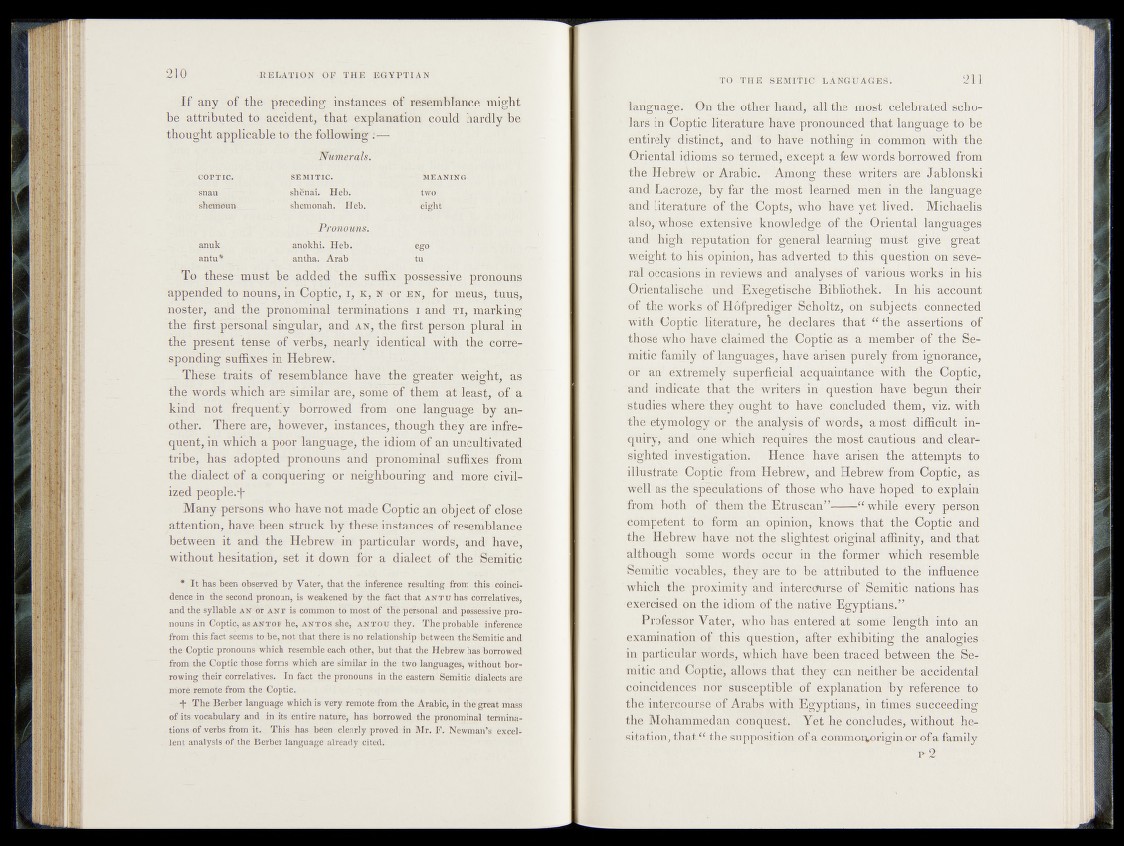
.If any of the preceding instances of resemblance might
be attributed tb accident, that explanation cOulicl hafdljrhe
thought applicable to-the following *>-—
Numerals'.
COPTIC. SEMITIC. MEANING.
snau shënai. Heb. ■ • two
shemoim___ shemonah. - I eight
Pronounsanuk
| anokhi. Heb, /• ■ ego
” antu* , antha. Arab tu
To these must be added the suffix possessive pronouns
appended to nouns, in Coptic, i , k , n or e n , for mens, tutfs,
noster, and the pronominal terminations, i and t i , marking
the first personal singular, and a n , the first person plural in
the present tense of verbs, nearly identical with I the corresponding
suffixes in Hebrew.
These traits of resemblance have the greater weight, as
the words which are similar are, some of them a t least,, of, a
kind not frequently borrowed from one language by another.
There are, however, instances, though they'are infrequent,
in which a poor language, the idiom of an uncultivated
tribe, has adopted pronouns and pronominal suffixes* from
the dialect of a conquering or neighbouring and more civilized
people.*}-
Many persons who have not made Coptic an object of close
attention, have been struck by these instances of resemblance
between it and the Hebrew in particular words, and have,
without hesitation, set it down for a dialect of the Semitic
* It has been observed by Vater, that the inference resulting from this coincidence
in the second pronoun, is weakened by the fact that a n t u has correlatives,
and the syllable a n Or a n t is common to most of the personal and possessive pronouns
in Coptic, as a n t o f he, a n t os she, a n t o u they. The probable inference
from this fact seems to be, not that there is no relationship between the Semitic and
the Coptic pronouns which resemble each other, but that the Hebrew has borrowed
from thé Coptic those forms which are similar in the two languages, without borrowing
their correlatives. In fact the pronouns in the eastern Semitic dialects are
moré remote from the Coptic.
-f- The Berber language which is very remote from the Arabic, in the great mass
of its vocabulary and in its entire nature, has borrowed the pronominal terminations
of verbs from it. This has bëen clearly proved in Mr. F. Newman’s excellent
analysis of the Berber language already cited.
Ikriguagé,*' Oh'thé' öthér' band, âllthe brost cëlébrated scholars
iri Coptic 1 Itériïtut ei’h àyépihn'oihfced that'lari^rifl^e to be
entïrély di$tmctr -?ari<i 'to-TraW^nöthing in éèmriiÓn %ith thè
Oriental idiothe^* termed, except a-*fêW Wbr d s- b orr otVed from
the Hebrew'1'or Arabilll ’ 'Ambhb'^tbesésÀ^rE'cr’^a'îet-Jablonski
and Lacrözêy by' fkr men in the1 'larigdage
and literature rif the'CôptsflWhé^ hsIVw-y-^liyddt1 ■- Michaelis
also,* whOS'd**extensive knowle^ffb p f the 'Oriental languages1
and high reputation for ’général learning-' an (is 14 gréât
weight ti/his opinion, has adverted t© tKis^qp^tóon oh Several
pebasibns in rèviéws and analyséSJf|§ varibu^Tw^rkè riifhïi^
Orientalisehe ‘ und Exrigétisch’è Bibliöthek.'* In his account
of the works of Hêfprediger Schpltz; on .
with'Ooptic»,'literature, ’he declares that ‘OhmassC irions;'«
thü^d* Who have claimt# the CbptîO^a'sJà ■nïèmbèV^of^ïtihè4 Semitie
family of‘Ipÿgua'ges, have arisen purely’from igrihraricé,
or an extremely 'Superficiah'acquEdht^ce^tvith 1 flu'^ ( ‘upfiev
and indicate that the writers in, question have begun their,
-studies' where they ought '*to have concluded them, vizV with
thë* etymology" or the analysis of words, a most difficult inquiry,
and one which reqhires the mösfrehutiOu&^afrti clearsighted
investigation. Hence have arisen the attempts to
illustrate Coptic^fro'mriHehfew, and Hebrew from Coptic,1 as--
well as the speculations of those who have hoped to explain
from both of them the Etruscan'’----while -’every person
competent to form an. opinion, knows that the Coptic arid
the Hebrew have not the slightest'original affinity* and that
although some words' occur in the former which 'resemble
Semitic vocables,’ they are to‘be attributed to thé' influenc'd'
which the .proximity and intercourse of Sdiriitic nations Mas
exercised on the idiom of the native Egyptians.”
Professor Vater, who has etetered at some length into an
examination of this question, after exhibiting the analogies -
in particular words, which have been .traced between the ,'SeT
mitic and Coptic, allows that they Gan neither be accidental
coincidences nor susceptible" of explanation by reference“ to
the intercourse of Arabs with Egyptians, in tiiries succeeding
the Mohammedan conquest,. -. Yet he ç one! u des,- .without bea,
sitation, that “ the supposition of a commor^origin or of a family
p-2